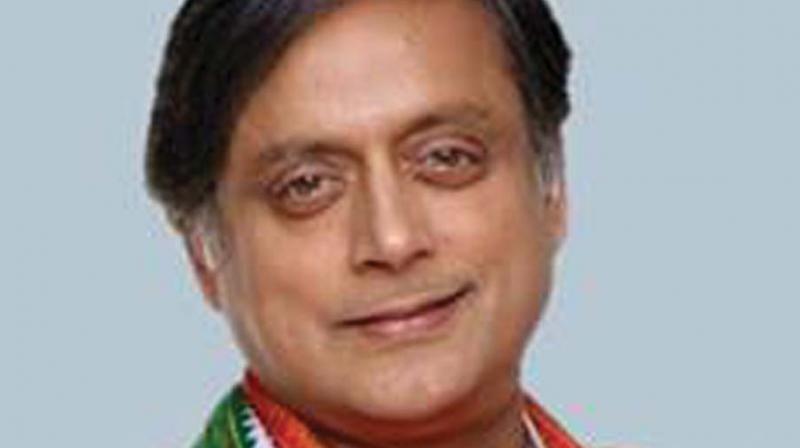When you are sick, you need \'khichdi\': Tharoor on BJP\'s \'khichdi govt\' jibe
There will be a new coalition government at the Centre with the Congress as its fulcrum on May 23 when the poll results will be out.

New Delhi: When you are sick, you need 'khichdi', says senior Congress leader Shashi Tharoor in response to Prime Minister Narendra Modi and other BJP leaders repeated ‘'khichdi government' barb at the opposition.
The country will "resoundingly cure" the nation's "political sickness" by showing the door to the BJP, the author-politician said, referencing the 'khichdi', a dal-rice-vegetable mix viewed as a recipe to counter all kinds of ailments that has become an oft-used metaphor in political discourse.
In an interview to PTI, he said there will be a new coalition government at the Centre with the Congress as its fulcrum on May 23 when the Lok Sabha poll results will be out.
On Modi's 'mahamilawat' (adulterated) jibe, Tharoor said the BJP has resorted to similar messaging every time it is pushed to the back foot, whether it is speaking of a "tukde-tukde gang", labelling people "anti-national" or asking those who don't agree with their worldview to go to Pakistan.
On the BJP's nationalism narrative, he alleged that Prime Minister Modi himself has not shieded away from politicising the armed forces, or projecting himself as the only capable protector of the country's national security.
He said the BJP is making the "callous assumption" that the Indian voter will forget that the promised "achhe din" never came.
"When BJP supporters speak of ‘mahamilawat' or say another coalition government would be a 'khichdi', I respond that when you are sick, you need khichdi!" he said.
"I have no doubt that the country will resoundingly cure our nation's political sickness by showing the door to the BJP by the 23rd of May," the former Union minister added.
Addressing a poll rally in Koderma, Jharkhand, Modi last week said the opposition's 'mission mahamilawat' is keen to form a "khichdi" government at the Centre, the strings of which will remain in the hands of the Congress.
Other senior BJP leaders have also warned against a ‘khichdi government' of opposition parties, asserting the BJP can provide a "mazboot sarkaar (strong government)" as opposed to the opposition's "majboor sarkaar (helpless government)".
Tharoor, who is seeking a third straight Lok Sabha term from Thiruvanathapuram, that went to polls on April 23, also said the current mood of the nation is overwhelmingly in favour of the Congress and this has been a source of great optimism and infectious energy for the party's ranks.
The voters of the country are simply fed up with the last five years of inept governance, divisive and communal politics and callous policymaking that has been the hallmark of the present ruling dispensation and are making their frustration clear while exercising their franchise, he claimed.
The Congress' credible narrative that has been put forward by the party has found widespread acceptance and popular support across the country, Tharoor added.
"Tharoor also said the Congress has spelt out a vision for the country that has been equally well received. The most notable example of this being the minimum income guarantee scheme “NYAY'.
The scheme's design, scale and impact is nothing short of revolutionary and there is palpable excitement across the country on the new paradigms of development, social justice and mobility that this will introduce, he said.
"There is undeniable fact that several parties that are currently ranged against our candidates are far more likely to support a Congress-led UPA-3 in a post-poll scenario than to go with a BJP-led alternative," he asserted.
In the event of neither party being able to command a majority by itself, the Congress' chances of forming a broad-based post-poll coalition are much brighter than the BJP's, Tharoor claimed.
Asked whether post-poll alliances could be a tricky proposition for the Congress as SP-BSP could seek a hard bargain, Tharoor said the Congress has an impressive record of being able to stitch post-poll alliances.
"At the same time, with regard to situations we have seen with the SP and the BSP prior to the elections, what needs to be made clear is the distinction between the grounds for a pre-poll alliance and a post-poll alliance," he said.
Asserting the calculations are very different in a post-poll scenario, Tharoor said the question that needs to be answered is fundamentally whether parties that are not regular Congress allies can find enough common ground to form a government.
"If the answer is yes, then we will strive towards drawing up a common minimum programme that is acceptable for all partners, as opposed to the broader, more widespread and more enduring agreement that we have with our pre-poll partners," he said.
"We saw a similar situation under UPA 1 and 2 where the Congress fought the elections with a set of pre-poll partners and then formed a government with a larger set of post-poll partners,” he said.

